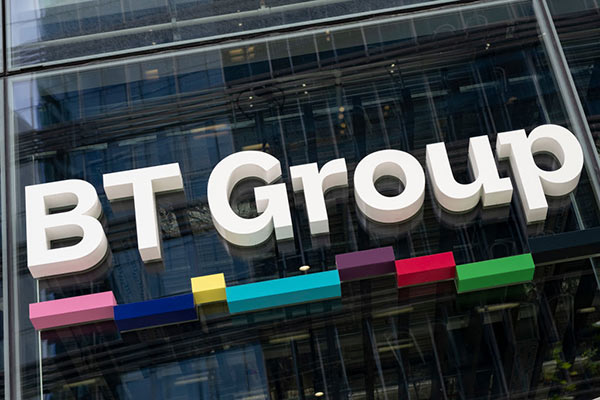BT could slice its dividend in half
27th June 2023 13:27
by Graeme Evans from interactive investor
Down 25% since their April peak and near their lowest price in 2023 so far, BT shares currently yield 6%. But a City analyst believes the payout is under threat.

Income from BT Group (LSE:BT.A) shares is at risk of being halved after a City firm today warned the telco’s current £751 million dividend bill did not appear sustainable.
The “sell” note by UBS analyst Polo Tang assumes that BT will have to cut the total dividend from 7.7p a share to 3.85p in order to avoid a big jump in debt costs.
- Invest with ii: How to Buy Shares| Free Regular Investing | Super 60 Investment Ideas
BT Group shares today fell 5.5p towards Tang’s new price target of 120p, leaving the popular FTSE 100 stock trading at close to its lowest point this year at 122p.
A dividend cut would mean another setback for retail shareholders, having missed out on three sets of payments in the pandemic period up to February 2022.
They are next due to receive 5.39p a share on 13 September subject to approval at the AGM in Birmingham on 13 July, a move that follows February’s interim award of 2.31p.
But Tang believes that the impact of rising interest rates and BT Sport costs are underestimated by the market and that this poses a risk to future dividends.
- Daily Trading Flash: 10 most-traded shares 27 June 2023
- Stockwatch: making sense of this ultra-low valuation
- Sector Screener: a potent mix of growth potential and defensive appeal
He forecasts free cash flow for next year will be at the bottom end of BT’s £1 billion-£1.2 billion guidance range, adding that restructuring and BT Sport joint venture costs have the potential to reduce this figure to £490 million.
This compares with funding commitments for both a dividend of £751 million and gross pension deficit payments of about £780 million.
Tang said: “Combined with share based payments/other outflows, BT Group is effectively borrowing more than £900 million a year to fund the dividend and pension deficit payments that we do not think is prudent amid the current high cost of financing.”
With £4.5 billion of debt to refinance in the next 24-36 months and UK interest rates likely to be higher for longer, Tang thinks there will be growing focus on BT’s debt costs.
Today’s note says the management team led by chief executive Philip Jansen has the right long-term strategy, but warns that near-term financials may be weaker than expected.
- Insider: Tullow Oil and GSK directors spend heavily on shares
- Stockwatch: the very real threat of a ‘balance sheet recession’
It points to the potential impact of rising promotional activity, which could offset the benefit of the consumer division’s April 14.4% index-linked price rise in the same way as happened after last year’s 9.3% increase.
Regulated arm Openreach has progressed quickly by reaching 10.3 million homes out of a fibre roll-out target of 25 million by 2026, but UBS said the rate of broadband line losses was increasing amid pressure on wholesale pricing.
Tang added: “Medium-term, there are uncertainties around a potential change in UK government with Labour indicating they will remove mid-contract price rises in Consumer and indexation at Openreach.”
Shares are down from 160p in April, having been lifted by French billionaire Patrick Drahi increasing the stake of his Altice business to 24.5%. However, the National Security & Investments Act and the BT Pension Scheme may limit further moves.
These articles are provided for information purposes only. Occasionally, an opinion about whether to buy or sell a specific investment may be provided by third parties. The content is not intended to be a personal recommendation to buy or sell any financial instrument or product, or to adopt any investment strategy as it is not provided based on an assessment of your investing knowledge and experience, your financial situation or your investment objectives. The value of your investments, and the income derived from them, may go down as well as up. You may not get back all the money that you invest. The investments referred to in this article may not be suitable for all investors, and if in doubt, an investor should seek advice from a qualified investment adviser.
Full performance can be found on the company or index summary page on the interactive investor website. Simply click on the company's or index name highlighted in the article.